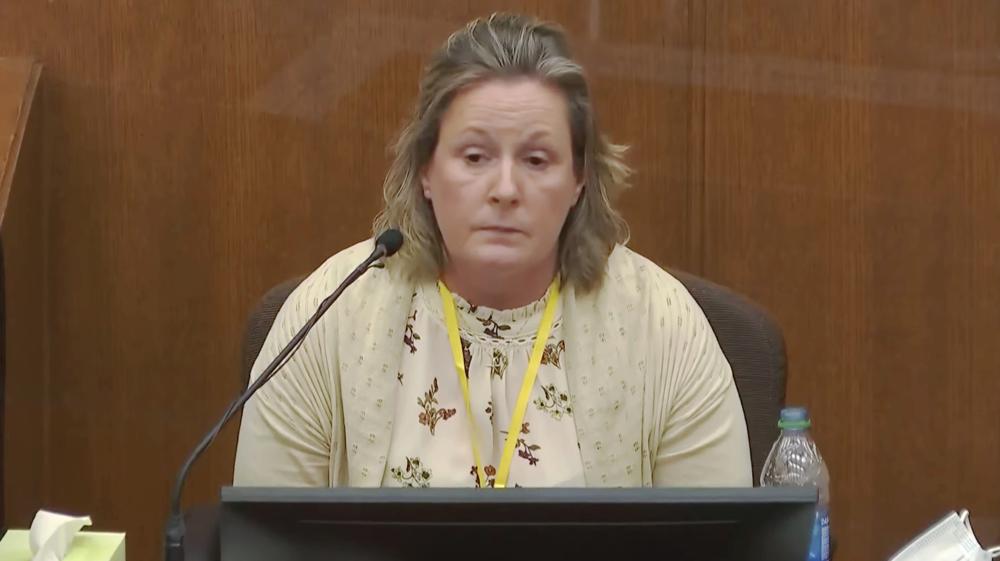In this screen grab from video, former Brooklyn Center Police Officer Kim Potter takes questions from the prosecution as she testifies in court, Friday, Dec. 17, 2021 at the Hennepin County Courthouse in Minneapolis, Minn. Potter is charged with first and second-degree manslaughter in the April 11 shooting of Daunte Wright, a 20-year-old Black motorist, following a traffic stop in the Minneapolis suburb of Brooklyn Center. (Court TV, via AP, Pool)
MINNEAPOLIS (AP) — Closing arguments are set for Monday in the manslaughter trial of the former Minnesota police officer who says she meant to use her Taser instead of her gun when she shot and killed Daunte Wright as he tried to drive away from a traffic stop.
Kim Potter’s case will go to the mostly white jury after Judge Regina Chu gives them final instructions. The judge has already told jurors that she will not make them deliberate on Christmas Eve or Christmas Day. They’ll return after the holiday if they haven’t reached a verdict by then.
The defense rested Friday after Potter told jurors that she “didn’t want to hurt anybody,” saying during her sometimes tearful testimony that she shouted a warning about using her Taser on Wright after she saw fear in a fellow officer’s face.
Potter, 49, testified that she was “sorry it happened.” She said she didn’t remember what she said or everything that happened after the shooting, saying much of her memory of those moments “is missing.”
Potter is charged with first-degree and second-degree manslaughter in the April 11 death of Wright, a 20-year-old Black motorist who was pulled over in the Minneapolis suburb of Brooklyn Center for having expired license tags and an air freshener hanging from his rearview mirror.
Potter, who was training another officer at the time, said she probably wouldn’t have pulled Wright’s car over if she had been on her own that day. After that initial encounter, the traffic stop “just went chaotic,” she testified.
“I remember yelling, ‘Taser, Taser, Taser,’ and nothing happened, and then he told me I shot him,” Potter, who is white, said through tears. Her body camera recorded Wright saying, “Ah, he shot me,” after the shooting.
Potter’s attorneys argued that she made a mistake but also would have been justified in using deadly force if she had meant to because Sgt. Mychal Johnson was at risk of being dragged by Wright’s car.
During cross-examination, prosecutor Erin Eldridge noted that Potter told a defense expert that she didn’t know why she drew her Taser. Quoting from the expert’s report, Eldridge said Potter told him: “I don’t have an answer, my brain said grab the Taser.” Potter testified she didn’t recall saying that.
Prosecutors have argued that Potter had extensive training about Taser use and in use of deadly force, including warnings about confusing the two weapons. Eldridge got Potter to agree that her use-of-force training was a “key component” of being an officer. Potter testified that she was trained on when to use force and how much to use, and that there was a department policy that dictated what officers could or could not do.
Wright’s death set off angry demonstrations for several days in Brooklyn Center. It happened as another white officer, Derek Chauvin, was standing trial in nearby Minneapolis for the killing of George Floyd.
Before Potter took the stand, a defense witness testified that police officers can mistakenly draw their guns instead of their Tasers under high-stress situations because their ingrained training takes over.
Laurence Miller, a psychologist who teaches at Florida Atlantic University, said that the more someone repeats the same act, the less they have to think about it and there can be circumstances during a stressful situation in which someone’s normal reactions may be “hijacked.”
Some experts are skeptical of the theory. Geoffrey Alpert, a criminology professor at the University of South Carolina who is not involved in Potter’s trial, has said there’s no science behind it.
State sentencing guidelines call for just over seven years in prison upon conviction of first-degree manslaughter and four years for second-degree, though prosecutors have said they plan to push for longer sentences.
Associated Press writers Tammy Webber in Fenton, Michigan, and Steve Karnowski in Minneapolis contributed to this report.
Copyright 2021 Associated Press. All rights reserved.





























